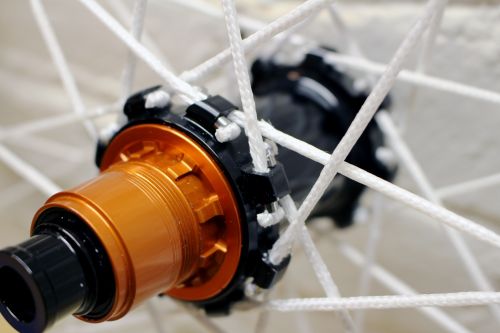MINNEAPOLIS — Polyethylene spokes from Berd LLC can shave up to 200 grams from a wheel while offering an improved fatigue life compared to metal spokes. The company's technology has caught the eye of weight weenies and the National Science Foundation, which awarded Berd a $225,000 grant last year.
What caught NSF's eye was the company's patented technology for grafting braided hollow polyethylene to a threaded stainless steel end that attaches to a standard nipple at the rim.
"Creating a hybrid of polymer and metal is very difficult. Polymers are difficult to bond to," said Charlie Spanjers, who founded Berd Spokes with Kyle Olson and Brad Guertin.
While Berd bonds the polyethylene to the threaded end, what really holds them together is the way the braid works like a Chinese finger trap, Spanjers said.
"The braid under tension provides a majority of the hold power," he said.
Spanjers recognizes that there have been various attempts at metal spoke substitutes in recent years, including spokes made of carbon, polymer and other materials. But none remain on the market apart from those used as a part of integrated wheel systems. Berd's
PolyLight spokes work with standard rims and with hubs designed for straight-pull or J-bend metal spokes.
Founded in 2015, Berd began selling spokes in early 2018.
Berd received a Eurobike Award last year as the spokes used by German brand Tune on its 999-gram Blackburner 29 TE (Textile Edition) mountain bike wheelset. It also is working with other wheel companies on new products. Bike shops, like Erik's Bikes, offer prebuilt wheels using the spokes. And Berd will relace existing wheels with its spokes for $595 retail.
"Depending on the spokes you replace, you will see up to a 200-gram weight savings. And this is rotating weight, so it is immediately noticeable," Spanjers said.
PolyLight spokes are manufactured in-house in Minnesota.
The thin filaments that make up the spoke braid provide noticeable vibration damping and resist catastrophic failure, the company said. A few filaments can get nicked or cut a without compromising the strength of the spoke.
The spoke braid will not absorb water or road grime, though grease may cause discoloration, and the spokes can be cleaned with soapy water like other spokes. Subzero riding conditions are no problem.
At the hub end, PolyLight spokes have a looped eyelet that is inserted through a hub spoke hole; a short piece of plastic rod is inserted into the eyelet to secure the spoke. On straight-pull hubs, the eyelet is pushed through the spoke hole and then the plastic rod is inserted through the eye. A small steel doughnut around the spoke prevents abrasion from any sharp edges on the hub.
At the rim end, Berd opted for 14-gauge threads for improved service life over lighter 15-gauge threads.
Berd sells its spokes to shops for in 1-millimeter lengths from 250 to 310 millimeters. The spokes are the same whether used for J-bend or straight-pull hubs, making inventory simpler. Retail pricing is $8 a spoke, or $224 for 28 spokes and $256 for 32. The company hopes to add distributors this year.
"Any experienced wheel builder can transition to our spokes with little problem, though there are a few differences. Spoke windup is an issue, but now we have a flat on our threaded ends so it is no different from tensioning a bladed spoke," Spanjers said.
To allow the braid and hub attachment to settle, Berd recommends waiting 24 hours between two final wheel truings after the initial build.




